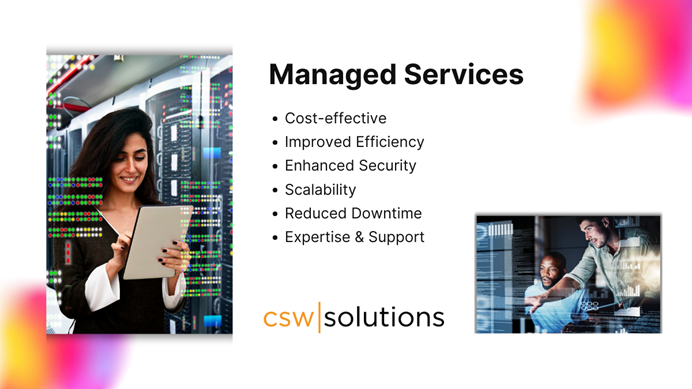Cloud migration and managed services are the best way to improve your business and operations. Read on to learn more about what CSW Solutions can do for you as your managed services partner.
Managed Services: The Secret Weapon for Business Efficiency
There is a constantly evolving digital landscape that we must contend with every day in the world of software and IT solutions. For businesses, there are additional factors, from operations and regulations to maintenance, security, and staff. With everything from inflation to cultural trends or innovations that are constantly redefining strategies and growth, businesses are turning to Managed Services Providers (MSPs) to help streamline their IT operations and support. But what exactly is an MSP, and what services do they offer?
In this article, we will delve into the world of managed services providers, exploring their role in business technology management and the benefits they can provide to organizations of all sizes. Whether you're a small startup or a large enterprise, understanding the value of partnering with an MSP can help your company stay ahead of the curve and focus on what matters most – growth and success.
Overview of Managed Services
As businesses continue to rely on technology for their day-to-day operations, the need for IT support and management has become increasingly important. Managed services involve outsourcing the responsibility for maintaining, managing, and improving a company's IT infrastructure and systems to a third-party provider. This allows businesses to focus on their core activities while the managed services provider takes care of tasks like network monitoring, cybersecurity, data backup and recovery, and software updates.

Role of the Managed Services Provider
Managed services providers (MSPs) are companies that offer these services to businesses, typically on a subscription basis. The role of the managed services provider is to proactively monitor and manage the client's IT systems to ensure they are running smoothly and securely. This includes identifying and addressing issues before they cause downtime or data loss, as well as implementing best practices to optimize performance and efficiency. The provider also offers support services to help users troubleshoot problems and get the most out of their technology.
Managed services providers offer a range of services that can help businesses improve their efficiency, productivity, and security. From network monitoring and cybersecurity to data backup and cloud services, MSPs can help businesses stay up-to-date with the latest technology trends and ensure that their systems are running smoothly.
In addition to technical support, MSPs also provide strategic guidance and consulting services to help businesses align their IT strategies with their overall business goals. By partnering with an MSP, businesses can benefit from the expertise of professionals who understand the complexities of modern technology and can provide customized solutions to meet their specific needs.
Furthermore, working with an MSP can also help businesses save time and money in the long run. Instead of hiring and training in-house IT staff, businesses can outsource their IT needs to a Managed Services Provider who can provide 24/7 support and proactive maintenance at a fraction of the cost. This allows businesses to focus on their core competencies and leave the technical details to the experts.
Managed Services Breakdown
A Managed Service Provider (MSP) offers a range of services to businesses to help them manage their IT infrastructure and operations more effectively. Some of the key services provided through an MSP include:
- Remote monitoring and management: MSPs use specialized tools to monitor the performance and security of a company's IT systems remotely. This helps to identify and address any issues before they escalate into major problems.
- Helpdesk support: MSPs offer helpdesk support to assist employees with IT issues and troubleshooting. This can include providing technical assistance, troubleshooting software problems, and resolving hardware issues.
- Cloud services: MSPs often provide cloud services, including cloud storage, backup, and hosting solutions. This allows businesses to store data securely in the cloud and access it from anywhere.
- Security services: MSPs offer a range of security services to help protect businesses from cyber threats, including antivirus software, firewall management, and security assessments.
- IT consulting: MSPs provide IT consulting services to help businesses develop IT strategies, plan for future growth, and optimize their technology investments.
Partnering with an MSP can help businesses improve their IT operations, reduce downtime, enhance security, and increase efficiency. By outsourcing IT services to an MSP, businesses can focus on their core operations while leaving the technical aspects to the experts.
Cost of Managed Services
When it comes to the cost of services provided through a Managed Services Provider (MSP), there are several factors to consider. MSPs offer a range of services, such as IT support, network monitoring, cybersecurity, and cloud computing, among others. The cost of these services will vary depending on the level of support required, the size of the organization, and the complexity of the IT infrastructure.
Some MSPs charge a flat monthly fee for their services, while others may charge based on the number of devices or users being supported. Additional fees may also be incurred for any extra services or special projects that fall outside of the standard scope of support but generally, MSPs can provide IT expertise and resources at a predictable cost, often lower than hiring internal IT staff.
It's important for businesses to carefully review the pricing structure of an MSP and understand what is included in the services being offered. While outsourcing IT services to an MSP can be cost-effective in the long run, it's crucial to ensure that the cost aligns with the level of support and expertise needed by the organization. By comparing pricing models and understanding the specific needs of the business, companies can make an informed decision about the cost of services provided through an MSP.

Benefits of Managed Services
A managed services provider (MSP) can offer a wide range of benefits to businesses of all sizes. Not only can an MSP help improve overall efficiency by streamlining processes through the management of IT systems and infrastructure, but it will also reduce costs and most importantly, increase security and access. This means a business can easily focus on its core activities without being bogged down by technical issues or cyber pirates. Cyber pirates are real, they just might be called something else, though! Anyway, here are just some of the other benefits you might find in finding the right MSP:
- 24/7 Monitoring and Support: MSPs have a team of skilled professionals who can provide round-the-clock support and monitoring, ensuring that any issues are quickly identified and resolved. This can help businesses improve their efficiency and productivity by minimizing downtime and disruptions. MSPs can also offer proactive maintenance and security services to help prevent issues before they occur.
- Trusted Expertise: MSPs have a team of professionals with specialized skills and knowledge in various areas of IT. This means that businesses can benefit from the expertise of multiple professionals without the headache of having to hire them individually and hope they won't get locked out of their own systems by a person who could just disappear without any accountability! That's pretty scary and we've seen it happen many times over the years. It also means that businesses will stay up-to-date with the latest trends or industry practices and advancements in technology, ensuring they have access to the best solutions for their needs. With an MSP, it will be much easier to stay competitive in a rapidly changing technological landscape.
- Cost Management: MSPs also offer predictable monthly costs, making it easier for businesses to budget for IT expenses. On top of budget-friendly options, MSPs reduce or eliminate the need for an in-house IT team, saving on salaries, benefits, and training costs. MSPs also offer scalable solutions, meaning businesses can adjust their services based on their needs, helping them save money in the long run.
Tips On Finding The One (MSP)
When looking for the right Managed Services Provider, there are many factors to consider. But before engaging with a Managed Service Provider (MSP), it is crucial to have a full understanding of your current usage and needs. This involves assessing your current IT infrastructure, identifying areas of improvement, and determining where you can benefit from the expertise of an MSP. By having a clear picture of your organization's requirements, you can effectively communicate your goals and expectations to the MSP. By considering these factors when searching for a managed services provider, you can find the right partner to help support and grow your business Here's our insider list for when you decide to take the MSP leap:
- First and foremost, you should look for a provider that has experience and expertise in your specific industry or niche. This will ensure that they understand your unique needs and can provide tailored solutions to help your business succeed.
- Next, it is important to have a roadmap in place outlining how the MSP can help improve processes or workflows within your organization. This should be a detailed outline of specific areas where the MSP can provide value, whether it's through implementing new technologies, optimizing existing systems, or enhancing cybersecurity measures. Having a well-defined plan will ensure that both parties are aligned on the objectives and outcomes of the partnership. Remember, that by taking the time to assess your current state, identify areas for improvement, and create a roadmap for working with an MSP, you can set the stage for a successful collaboration that delivers tangible benefits to your organization.
- Look for a managed services provider that offers a range of services that cover all the bases, and by bases, we mean the entire scope of your IT needs. This could include services such as network monitoring, cybersecurity, cloud computing, and data backup and recovery. Having a comprehensive suite of services will ensure that all of your IT requirements are met by a single provider and an experienced MSP will do their homework but you will also need to do yours.
- Consider the provider's pricing structure and whether it fits within your budget. Look for a provider that offers transparent pricing with no hidden fees, as well as flexible contract options that can be tailored to your specific needs. Make sure you understand all fees and additional charges upfront to avoid any surprises down the line. A reputable MSP will take the time to get to not only get to know your stakeholders and your infrastructure but also your business and processes. There is a lot to say about really knowing who you are working with and trusting that they have your best interests in mind, rather than just trying to milk the clock.
- On that note, another important factor to consider is the provider's level of customer support and responsiveness. You want to work with a provider that is easy to reach, or possibly in your own time zone, and can quickly respond to issues. A proactive MSP will easily find ways to address potential problems before they escalate, sometimes even while you're asleep. Communication is often the most frustrating part of support, so you want to find someone who is flexible and capable no matter what problems arise.
Conclusion
Managed services providers play a crucial role in helping businesses navigate the complex world of technology and achieve their business objectives without a lot of overhead. By partnering with an MSP, businesses can benefit from a wide range of services and support that can help them stay competitive without breaking the bank. Whether you're looking to improve your data access and security, streamline your IT operations, or optimize the power of your cloud solutions, an MSP can help you take your business to the next level. Managed services providers also help businesses stay up to date with the latest technology trends and ensure that all systems are secure and compliant with industry regulations. Overall, partnering with an MSP can offer peace of mind, cost savings, access to expertise, and improved efficiency, making it a valuable investment for many organizations. Managed services providers play a vital role in helping businesses realize their potential without missing a step!
If you're interested in learning more, why not reach out to us today and meet our team of managed services experts so we can get you on the road to success while the year is young?!

